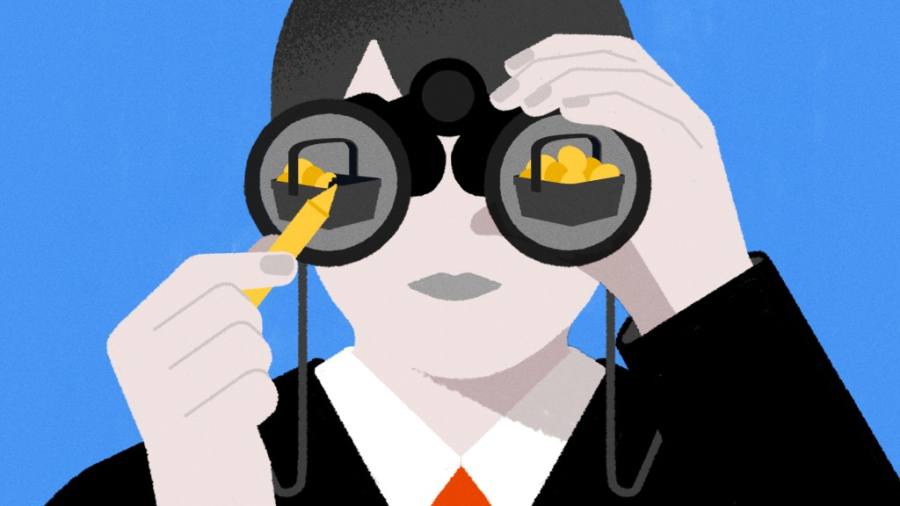
Shortly after the meltdown of FTX came to light last week, the name SoftBank cropped up among the early backers of the stricken cryptocurrency exchange. Inevitably, perhaps.
The Japanese tech conglomerate, say people close to it, will take a full writedown on its FTX investment of about $100mn: horrible but, when placed against the more show-stopping $10bn investment loss SoftBank revealed at its second-quarter results on Friday, almost comfortingly modest.
In the mishap-strewn trail from WeWork to this latest debacle, the sense of omni-blunder by the world’s most prominent (and self-declared) “vision capitalist” is now properly bedding in. SoftBank may claim to be in full defensive mode and its founder less involved in the running of the investments. But where there is an opportunity to lose money on tech these days, Masayoshi Son still seems one step ahead of the market at having found it ages ago. He may also, in the company of visionaries such as Elon Musk and Mark Zuckerberg, be among the clearest modern-day re-definers of John Kenneth Galbraith’s “bezzle”.
The term was coined by the famous economist nearly 70 years ago and describes the temporary discrepancy between perceived asset values and their real longer-term value — a gap that history suggests widens most during boom times and periods of irrational exuberance.
Galbraith derived his concept from the idea that, in the sometimes lengthy period between a crime being committed and exposed, both the embezzler and their victim can enjoy the same sense of ownership over one asset. This false double ownership defines the bezzle, he suggested, and the victim is at this point in possession of a sometimes significant quantity of “psychic wealth”.
Charlie Munger, the billionaire vice-chair of Berkshire Hathaway, refined the concept 20 years ago with the argument that the bezzle doesn’t require embezzlement, a Ponzi-type scheme or any fraud to exist. When market valuations become divorced from the true earning capacity of the asset, they too create that illusory “psychic wealth” on which individuals, companies and entire economies can thrive for what are often surprisingly protracted periods.
Three years ago, in the FT, Merryn Somerset Webb argued that a decade of loose monetary policy after the global financial crisis had once again updated the bezzle for modern times: all it takes is great PR, easy money and a stint where markets are untroubled by the “impossibility of profitability”.
Others have made the case that the bezzle has evolved many modern faces. Most of them are well outside the original framework of fraud and many, says the economist Michael Pettis, occur alongside instances where debt is also surging.
In addition to the bezzle formed by inflated asset bubbles, overpriced collectibles and speculative currency runs, Pettis notes, one of the largest sources of bezzle in an economy is created when there is huge over-investment in infrastructure or manufacturing facilities that are never justified by the economic value created. Japan’s notorious building of “bridges to nowhere”, and more recently China’s construction boom, he says, are prime bezzle-generators.
Son, Musk, Zuckerberg and others, though, may now stand in a class of their own. Certainly, one can argue that they are simply part of already identified sources of bezzle creation: the valuations attached to their own companies and those in which they invest suddenly look an awful lot like gaseous giants in a larger asset bubble universe.
But the case could also be made that these figures — and others across the tech world granted success by the emergence of metrics that did not exist a few years ago — represent a bezzle of futurology.
Son and others cast themselves, and are willingly cast by their fans, as visionaries. Success in one or more areas has bestowed on them the perception that they know what technology, industries, economies and societies will do and want next. In these visionaries’ shadows, others have often been given a similar benefit of the doubt, especially when someone like Son has endorsed a lesser visionary by pumping billions of dollars into their vision.
The plunging tech valuations that have hurt SoftBank do not, even now, completely invalidate the hunches that some of these figures have bet on. Son and others may be proved resoundingly correct in years to come. But it seems increasingly clear that they have grown fabulously wealthy in a bubble of belief in the power of vision that has, in turn, produced a new brand of bezzle, waiting to be revealed by the coming months and years.